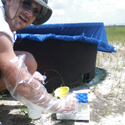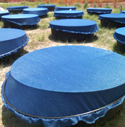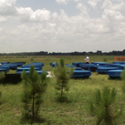Agrochemicals in Freshwater Ecosystems
Dr. Johnson is collaborating with Dr. Jason Rohr and other members of his research lab at the University of South Florida to use food web theory to study the effects of agrochemicals on freshwater ecosystems. The first goal of this study is to assess whether community and ecosystem responses to pesticides are similar within classes of pesticides (e.g., herbicide, insecticide, fungicide) but differ between classes. The second goal is to determine if community responses to mixtures of agrochemicals can be predicted based on analogy to the effects of predators of the taxa targeted by the agrochemicals. The third goal is to evaluate the effects of agrochemicals on the abundance of waterborne human pathogens (e.g. Escherichia coli O157:H7), fecal indicator bacteria (E. coli, Enterococcus spp.), and sources of livestock helminthes. The fourth and final goal is to evaluate the effects of pesticides on the immune system of amphibians and on the prevalence of infection by Batrachochytridium dendrobatidis, a fungus linked to recent declines and extinctions of amphibians. The results of this study will provide valuable insights that will help to guide agricultural pest management practices, in order to minimize effects of pesticides on natural communities and help to minimize threats posed to health of livestock and humans by waterborne pathogens.


